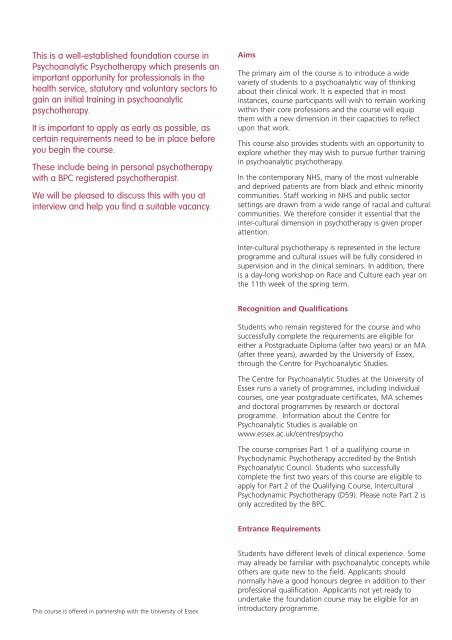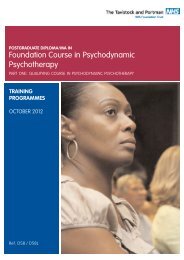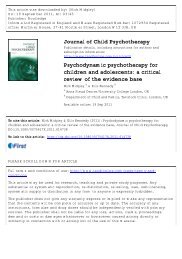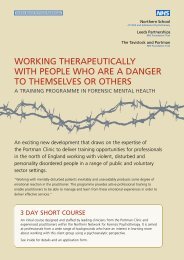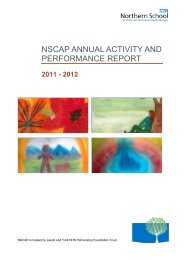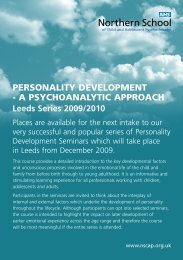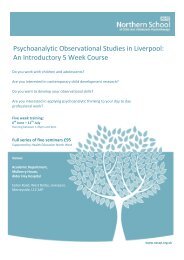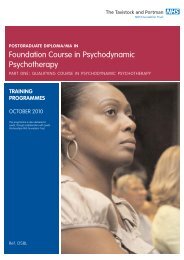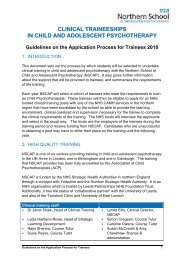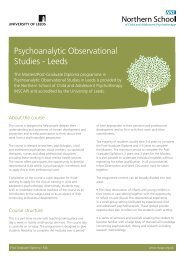D58 Course Outline.qxp - Northern School of Child and Adolescent ...
D58 Course Outline.qxp - Northern School of Child and Adolescent ...
D58 Course Outline.qxp - Northern School of Child and Adolescent ...
- No tags were found...
You also want an ePaper? Increase the reach of your titles
YUMPU automatically turns print PDFs into web optimized ePapers that Google loves.
This is a well-established foundation course in<br />
Psychoanalytic Psychotherapy which presents an<br />
important opportunity for pr<strong>of</strong>essionals in the<br />
health service, statutory <strong>and</strong> voluntary sectors to<br />
gain an initial training in psychoanalytic<br />
psychotherapy.<br />
It is important to apply as early as possible, as<br />
certain requirements need to be in place before<br />
you begin the course.<br />
These include being in personal psychotherapy<br />
with a BPC registered psychotherapist.<br />
We will be pleased to discuss this with you at<br />
interview <strong>and</strong> help you find a suitable vacancy.<br />
Aims<br />
The primary aim <strong>of</strong> the course is to introduce a wide<br />
variety <strong>of</strong> students to a psychoanalytic way <strong>of</strong> thinking<br />
about their clinical work. It is expected that in most<br />
instances, course participants will wish to remain working<br />
within their core pr<strong>of</strong>essions <strong>and</strong> the course will equip<br />
them with a new dimension in their capacities to reflect<br />
upon that work.<br />
This course also provides students with an opportunity to<br />
explore whether they may wish to pursue further training<br />
in psychoanalytic psychotherapy.<br />
In the contemporary NHS, many <strong>of</strong> the most vulnerable<br />
<strong>and</strong> deprived patients are from black <strong>and</strong> ethnic minority<br />
communities. Staff working in NHS <strong>and</strong> public sector<br />
settings are drawn from a wide range <strong>of</strong> racial <strong>and</strong> cultural<br />
communities. We therefore consider it essential that the<br />
inter-cultural dimension in psychotherapy is given proper<br />
attention.<br />
Inter-cultural psychotherapy is represented in the lecture<br />
programme <strong>and</strong> cultural issues will be fully considered in<br />
supervision <strong>and</strong> in the clinical seminars. In addition, there<br />
is a day-long workshop on Race <strong>and</strong> Culture each year on<br />
the 11th week <strong>of</strong> the spring term.<br />
Recognition <strong>and</strong> Qualifications<br />
Students who remain registered for the course <strong>and</strong> who<br />
successfully complete the requirements are eligible for<br />
either a Postgraduate Diploma (after two years) or an MA<br />
(after three years), awarded by the University <strong>of</strong> Essex,<br />
through the Centre for Psychoanalytic Studies.<br />
The Centre for Psychoanalytic Studies at the University <strong>of</strong><br />
Essex runs a variety <strong>of</strong> programmes, including individual<br />
courses, one year postgraduate certificates, MA schemes<br />
<strong>and</strong> doctoral programmes by research or doctoral<br />
programme. Information about the Centre for<br />
Psychoanalytic Studies is available on<br />
www.essex.ac.uk/centres/psycho<br />
The course comprises Part 1 <strong>of</strong> a qualifying course in<br />
Psychodynamic Psychotherapy accredited by the British<br />
Psychoanalytic Council. Students who successfully<br />
complete the first two years <strong>of</strong> this course are eligible to<br />
apply for Part 2 <strong>of</strong> the Qualifying <strong>Course</strong>, Intercultural<br />
Psychodynamic Psychotherapy (D59). Please note Part 2 is<br />
only accredited by the BPC.<br />
Entrance Requirements<br />
This course is <strong>of</strong>fered in partnership with the University <strong>of</strong> Essex<br />
Students have different levels <strong>of</strong> clinical experience. Some<br />
may already be familiar with psychoanalytic concepts while<br />
others are quite new to the field. Applicants should<br />
normally have a good honours degree in addition to their<br />
pr<strong>of</strong>essional qualification. Applicants not yet ready to<br />
undertake the foundation course may be eligible for an<br />
introductory programme.


